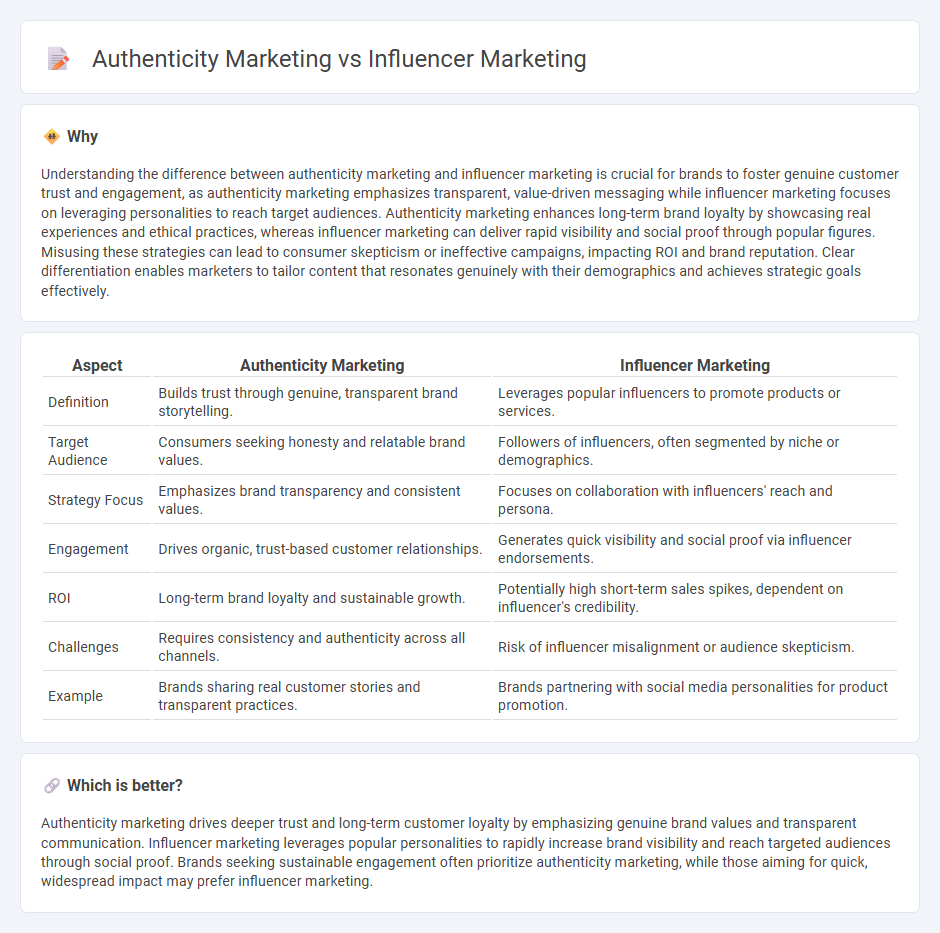
Authenticity marketing emphasizes genuine brand storytelling and transparent customer interactions to build trust and long-term loyalty. Influencer marketing leverages popular personalities with established audiences to promote products and amplify brand visibility rapidly. Explore the key differences and strategic benefits of authenticity versus influencer marketing to optimize your campaign success.
Why it is important
Understanding the difference between authenticity marketing and influencer marketing is crucial for brands to foster genuine customer trust and engagement, as authenticity marketing emphasizes transparent, value-driven messaging while influencer marketing focuses on leveraging personalities to reach target audiences. Authenticity marketing enhances long-term brand loyalty by showcasing real experiences and ethical practices, whereas influencer marketing can deliver rapid visibility and social proof through popular figures. Misusing these strategies can lead to consumer skepticism or ineffective campaigns, impacting ROI and brand reputation. Clear differentiation enables marketers to tailor content that resonates genuinely with their demographics and achieves strategic goals effectively.
Comparison Table
| Aspect | Authenticity Marketing | Influencer Marketing |
|---|---|---|
| Definition | Builds trust through genuine, transparent brand storytelling. | Leverages popular influencers to promote products or services. |
| Target Audience | Consumers seeking honesty and relatable brand values. | Followers of influencers, often segmented by niche or demographics. |
| Strategy Focus | Emphasizes brand transparency and consistent values. | Focuses on collaboration with influencers' reach and persona. |
| Engagement | Drives organic, trust-based customer relationships. | Generates quick visibility and social proof via influencer endorsements. |
| ROI | Long-term brand loyalty and sustainable growth. | Potentially high short-term sales spikes, dependent on influencer's credibility. |
| Challenges | Requires consistency and authenticity across all channels. | Risk of influencer misalignment or audience skepticism. |
| Example | Brands sharing real customer stories and transparent practices. | Brands partnering with social media personalities for product promotion. |
Which is better?
Authenticity marketing drives deeper trust and long-term customer loyalty by emphasizing genuine brand values and transparent communication. Influencer marketing leverages popular personalities to rapidly increase brand visibility and reach targeted audiences through social proof. Brands seeking sustainable engagement often prioritize authenticity marketing, while those aiming for quick, widespread impact may prefer influencer marketing.
Connection
Authenticity marketing leverages genuine brand values to build trust, while influencer marketing utilizes trusted personalities to convey these values, creating a powerful synergy. Influencers who embody authenticity enhance campaign credibility, driving deeper audience engagement and loyalty. This connection optimizes brand perception and boosts conversion rates by aligning marketing messages with authentic experiences.
Key Terms
**Influencer Marketing:**
Influencer marketing leverages popular social media personalities to promote brands, driving engagement through trusted content creators with dedicated followings. This strategy often results in increased brand visibility and higher conversion rates, especially on platforms like Instagram, TikTok, and YouTube where influencers hold significant sway. Explore the nuances of influencer marketing to maximize your brand's reach and authenticity.
Sponsorship
Sponsorship in influencer marketing often revolves around paid partnerships where brands leverage the influencer's reach to promote products or services, aiming for broad visibility and quick engagement. Authenticity marketing prioritizes genuine endorsements where sponsorships align closely with the influencer's values, fostering trust and long-term consumer loyalty. Explore further to understand how balancing sponsorship and authenticity drives impactful marketing strategies.
Endorsement
Influencer marketing leverages popular figures to endorse products, boosting brand visibility through their followers and perceived credibility. Authenticity marketing centers on genuine, transparent endorsements that build long-term trust rather than short-lived hype. Explore how blending both strategies can enhance your brand's endorsement impact effectively.
Source and External Links
Influencer marketing - Wikipedia - Influencer marketing is a social media marketing strategy where brands collaborate with influencers who have credibility and an established audience to endorse products, influencing buyers' habits through sponsored content on platforms like Instagram, YouTube, TikTok, and more.
What Is Influencer Marketing? - Mailchimp - Influencer marketing involves working with individuals who have a following to increase brand exposure, with effective campaigns requiring clear goals, audience alignment, and a well-planned budget considering influencer fees and campaign costs.
Influencer Marketing: All You Need to Know to Plan, Execute, and ... - Influencer marketing helps brands build trust and awareness by collaborating with influencers who endorse products authentically, with success hinging on tailored strategies per social media platform and a focus on ROI through careful influencer selection and campaign design.
 dowidth.com
dowidth.com